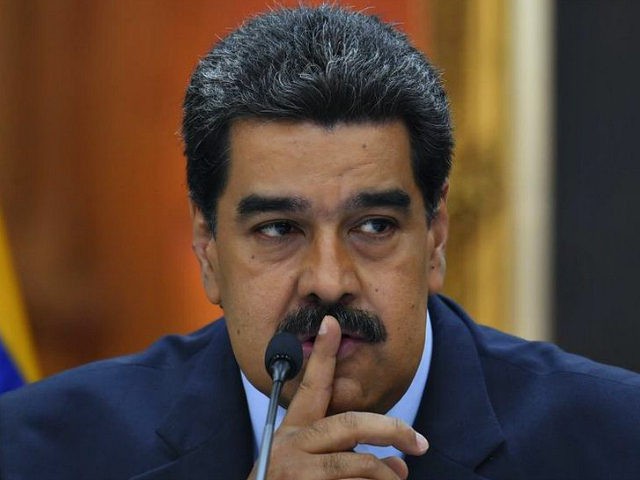The Socialist International (SI), the largest coalition of leftist political parties in the world, condemned Venezuela’s socialist dictator Nicolás Maduro as “illegitimate” and lent its full support to the nation’s opposition in a meeting of its Council on Tuesday.
The SI Council also agreed to eject the Sandinista National Liberation Front (FSLN) of Nicaragua from the organization after over a year of violent crackdowns on pro-democracy dissidents who have called for free and fair elections to replace socialist leader Daniel Ortega. In yet another rebuke of authoritarian socialism in Latin America, the group issued a statement warning Bolivia’s socialist leader Evo Morales against eroding democratic norms in his country following his announcement he would seek a fourth term as president despite his nation’s term limit laws.
Maduro’s United Socialist Party of Venezuela (PSUV) is not a member of the SI. While Maduro and his supporters in the United States have attempted to paint the opposition as conservative, right-wing, or fascist, Popular Will, the opposition political party that Venezuela’s Interim President Juan Guaidó helped found, does belong to the SI. Henry Ramos Allup, one of the main leaders of the defunct Venezuelan opposition coalition known as the Democratic Unity Roundtable (MUD), remains a vice president of the organization.
Despite Maduro’s being the world’s most prominent socialist regime, the Socialist International has consistently condemned his tenure, demanding free elections and calling Maduro’s Venezuela a “failed state.”
“The Council of the Socialist International … Expresses its enormous concern at the repression carried out against the Venezuelan people by the illegitimate regime of Nicolás Maduro, and urges the full restoration of the constitutional order,” the SI Council asserted in a declaration agreed upon in its Dominican Republic meeting this week. “To date, 35 people have been killed in the protests, more than 850 detained and hundreds injured, especially in the poorer districts of the entire country, at the hands of the security forces commanded by Nicolás Maduro.”
Conversely, the SI statement urged ” the full restoration of and respect for the democratically legitimate National Assembly,” which Guaidó led as its president before becoming head of state. The group also stated it “recognizes the efforts of Juan Guaidó, president of the National Assembly and recognized by a significant part of the international community as interim president of Venezuela, to bring about a transition to democracy.”
The statement stopped short of referring to Guaidó as the president of Venezuela, despite having taken an oath of office last week as the Venezuelan constitution mandates when a leader violates the democratic order or human rights norms, both of which Maduro has done. Instead, the SI Council reiterated that “the democratic legitimacy of the president and government in Venezuela comes only from the freely expressed will of the Venezuelan people,” without elaborating.
Guaidó’s status as a founding member of an SI party has gone largely unreported in English-language U.S. media, which have instead opted to highlight Maduro’s perception of the opposition as the “fascist right.” This has led to confusion among some in the American left, who claim the socialists are “a far-right opposition” organized by Washington. America’s far left has found itself at odds with the IS in the past, however. In 2017, the Democratic Socialists of America voted to leave the coalition in part because its support for human rights and democratic values was too “neo-liberal.”
The Council not only condemned Maduro, but issued separate statements attacking two of his few remaining allies in Latin America: Bolivia’s Morales and Nicaragua’s Ortega. The rebuke against Morales, who forced Bolivia’s Supreme Court to allow him to run for a fourth term despite violating the constitution, was mild.
“The SI Council takes note of the warning of the risk to democracy outlined by the delegate of its member party National Unity (UN) of Bolivia,” it stated. “The Socialist International calls on the government and the opposition parties in this country to deepen democratic values and principles, urging the Supreme Electoral Tribunal of Bolivia to guarantee free and transparent elections this year, 2019.”
Nicaragua’s Sandinista’s suffered the greater consequence of being expelled from the Socialist International.
“Socialism is incompatible with tyranny,” Spanish President Pedro Sánchez, a vice president of the SI, said through his party’s Twitter account in announcing the expulsion. The SI officially stated it had expelled the party “due to human rights violations and violations of democratic values committed by the Daniel Ortega regime.”
Ortega’s regime has for months been using torture, arbitrary arrest, and political prisons to silence an opposition increasingly demanding elections. A study by the Inter-American Commission on Human Rights and the Organization of American States (OAS) released last week found evidence that Ortega’s regime used extrajudicial killings, rape, and torture against mostly student protesters since an organized, peaceful effort for change against socialist arose early last year.
The SI’s stances against socialists in Latin America did not deter it from condemning more common sources of leftist frustration, such as “populism” and “fake news.” The group issued a declaration warning that “the deliberate discrediting of democratic institutions and the press, fake news, cyber attacks and invasive technology” were all threats to radical leftism, urging politicians not to embrace critiques of the media for publishing inaccurate information.

COMMENTS
Please let us know if you're having issues with commenting.